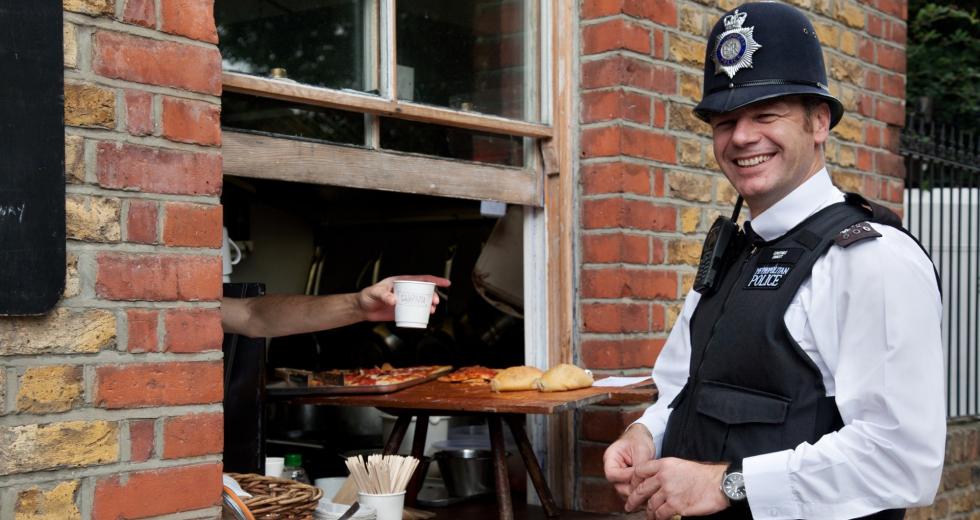
Photo: Jorge Ryan
In recent months evidence has been emerging of a dangerous change in policing both north and south of the border. We ignore these events at our peril.
In Scotland a highly centralised Police Scotland has been formed by merging the original 8 police districts. Under the control of one Chief Constable, Sir Stephen House, Police Scotland has rapidly become a law unto itself. Aside from the fact that there is now no possibility of independent investigation of the police, as Police Scotland will investigate Police Scotland, Chief Constable House has been brazenly arming police on routine patrols across Scotland. When the prevelance of armed offices came to the attention of Members of the Scottish Parliament, House effectively told the elected members that the arming of police was his affair and not theirs.
His alarming dictatorial control then shifted to Scotland's judges as he tried to influence a Sheriff who had deep concens over police cover-ups. "Scotland's top cop Sir Stephen House slapped down after trying to interfere with the role of sheriffs." Nothing serious there then.
Coupled with armed police patrols, police bullying of judges and police cover-ups, we must remember that there is no separation of powers in Scotland. The Cabinet Minister for Justice is just that - a political cabinet minister. He is responsible for the Justice system, security, access to justice, criminal law and procedure, civil law, the police, the legal profession, courts, sentencing, prisons and prisoners, victims and witnesses, reducing reoffending, youth justice, criminal justice social work, community safety, fire and rescue services, anti-social behaviour, drugs policy, violence reduction, anti-sectarianism & liquor licensing.
Since the SNP holds total political power, and under the hand of Nicola Sturgeon it has already been accused of Nazi style control over its Members of the Scottish Parliament, the present SNP Minister for Justice Michael Matheson, holds immense power over all aspects of the law. In a party where criticism of the party policy is barred, Matheson's justice policies, however draconian, are unlikely to be challenged.
So a troika of Nicola Sturgeon, Matheson and House, now control the law and policing in Scotland. They are above the law, control the law and are the law. Aside from armed police that the public do not want, we should also remember that Police Scotland have recently refused to give evidence when a man died in custody. East Germany or the new Scottish model of government?
Not so many years ago British politicians on both sides of the border would have been shouting in horror at such flagrant abuse of power in a thirld world country let alone in Europe. Now there is a just a defening silence.
In England the centralisation of the 43 police districts is happening by stealth. The smokescreen is 'austerity' cuts. Westminster would have us believe that the shortage of public money means that every police force must look for savings, and that invariably means amalgamation and privatisation. Devon and Cornwall and Dorset police are already getting into bed together to save money and others are following.
The 'austerity' banner is assisted by an increasingly poisonous environment within the police itself. An already hard and sometimes dangerous job has become even more pressured, target driven and laden with paper. In addition the political interference and meddling is relentless.
Whilst many people know only too well that the Independent Police Complaints Commission is certainly not independent or trustworthy, the 'grouping up' of police districts, means the opportunity for at least a separate police force to conduct an investigation is dwindling fast. In parallel, control of police policy and training has been slipped into the hands of the former Association of Chief Police Officers ACPO, an unaccountable private company. Now replaced by the National Police Chiefs Council NPCC, a decision which ACPO alone made, NPCC is a body of unknown legal standing, and is in any case, buried out of public sight within the Metropolitan Police.
How has it been possible that British Constables, a civilian service and traditionally unarmed apart from batons, have been allowed to fall under the control of their own increasingly unaccountable senior officers? How is it also possible that these same senior officers have taken the British 'bobby' from unarmed with public respect, to paramilitary, black uniformed and heavily armed, with corresponding public concern and fear?
As with Scotland, the visible and increasingly unaccountable power of the police could only have been achieved with the agreement, or perhaps acquiescence of our politicians. If the latter, what has caused them to remain silent as our police have become thuggish black shirts, bristling with automatic weapons, tazers, gas and high tech batons, whilst the tally of deaths in custody has spiralled?
The overhwelming evidence appears to be that the transformation of British police has been achieved with the agreement of our elected political masters. The new policing policy changes have been drifted in backed by Westminster, and more recently a devolved Scottish Parliament, both using an opaque visibility.
As Tony Bunyan, Statewatch Editor, commented in 2008: "We can now see a pattern emerging across the EU where people who exercise their democratic right to attend cross border protests are confronted by aggressive para-military policing, surveillance, preventive detention and expulsion.
This is a reflection of the EU's definition of "security" at international events which is now defined as covering both "counter-terrorism" and "public order".
Back in 2003 the bilateral exchange of information on "suspected troublemakers" between EU states for international events was agreed. What is proposed now is not the one-off exchange of information related to a specific event but a permanent EU-wide database of suspected "troublemakers", this is utterly unacceptable in a democratic Europe."
If the draconian EU policing objectives are the most transparent, a raft of other factors have driven the militarisation and metamorphosis of our 'Bobbies.'
Factors influencing police behaviour include dramatic changes in Personality and Values. Upstanding, reliable and tustworthy public servants are out, and low intellect, tattooed, 'just need a job' are in. This aspect is adversely reinforced by the increasing privatisation of police roles by companies such as G4S.
Next to changes in the type of individual policing us, we now have significant changes in police training itself. The caring, protecting public servant training model is out, and the heavyweight armed response against a dangerous and unpredictable public containing would be terrorists is in. Training by knowledgeable and experienced police officers is old hat, and has been replaced by Leadership and Diversity Courses using political charities such as Common Purpose, with applied behavioural psychology and mental reframing by NLP.
Leading Powerful Partnerships for example was a five day police training course backed by both the Home Office and the Scottish Police College. Aimed at senior 'leaders' in the police service and across the public and voluntary sectors... "the programme challenges leaders to step outside their comfort zone, try different approaches and reinigorate their creative thinking.
Participants can expect to return to the workplace with renewed energy and an insight into how they can enable their organisation to thrive and work successfully with partners..."
Strange, that at a time when many would say that the police are failing to perform the simple task of protecting the public, and their emphasis seems to increasingly be upon tough public order and counter insurgency measures, they are being 'challenged to step outside their comfort zone, try different approaches and to reinvigorate their creative thinking'.
Noteable also that the 'Leading Powerful Partnerships' training is just that - training to stimulate and facilitate working with partners. Isn't a fundamental principle of good policing that they are independent of others and can investigate without fear or favour? The question is, who decided that the police needed training in partnerships, and why?
Perhaps we get a clue via Dame Shirley Pearce, a Clinical Psychologist and 'Independent' Chair of the College of Policing? Or then again perhaps they really do need her experience with Cambridge and East Anglia Universities, or the Higher Education Funding Council for England, or Health Education England.
A better clue would appear to come from the heavy penetration of the political charity Common Purpose in the police. Also encouraging its 'future leaders' to step outside their comfort zone and lead 'beyond authority', Common Purpose took partnership working to a whole new level. Senior police officers were trained to 'break out of their professional and social 'silos' to lead beyond authority.' Yes that is correct...'lead beyond their professonally given authority', and hence their professional and public accountability.
Leading outside their authority, many senior police officers such as Geoff Dodd Divisional Commander Chief Superintendent and Assistant Chief Constable Steve Smith West Yorkshire police were recruited to Common Purpose's Advisory Boards to work in partnership with individuals from the public, private and voluntary sectors - behind closed doors naturally, and using 'Chatham House' rules to protect the identity of those present.
As Maria Wallis former Chief Constable Devon and Cornwall Police said in Common Purpose's own publicity material..."An intensive and fascinating insight into decision making at the top level ...20:20 has helped me to understand the mechanics of policy making in the UK and Europe and how to influence it."
Remembering that the poor performance of Maria Wallis caused mayhem in Devon and Cornwall Constabulary, and great angst amongst her civilian staff, it also ultimately led to her departure. We might wonder if her mind was too focused on the "mechanics of policy making in the UK and Europe and how to influence it" rather than on policing Devon and Cornwall and catching criminals.
Since Common Purpose taught Maria about UK and EU policy making, we might perhaps assume that Common Purpose was enacting policy in selecting and training her. We might also assume that Common Purpose was steering her to influence that UK and European policy in their own image. We might also assume that the policy changes included policing policy with a heavy bias towards EU driven policing models, for which Tony Bunyan Statewatch Editor gave warning.
Returning to the question as to whether our policians knew about the dangerous changes to the face of British policing, of course they knew. The change has been too broad, too deep and too calculated for them not to. We can assume therefore that our politicians north and south of the border have been a key part of the police transformation to a paramilitary status. That the real object of the change has been undeclared to the public and implemented largely by stealth, must surely lead us to believe that our politicians do not have the best interests of the public at heart.
Unchecked, the transformation of our police, represents a dangerous monster in waiting.

